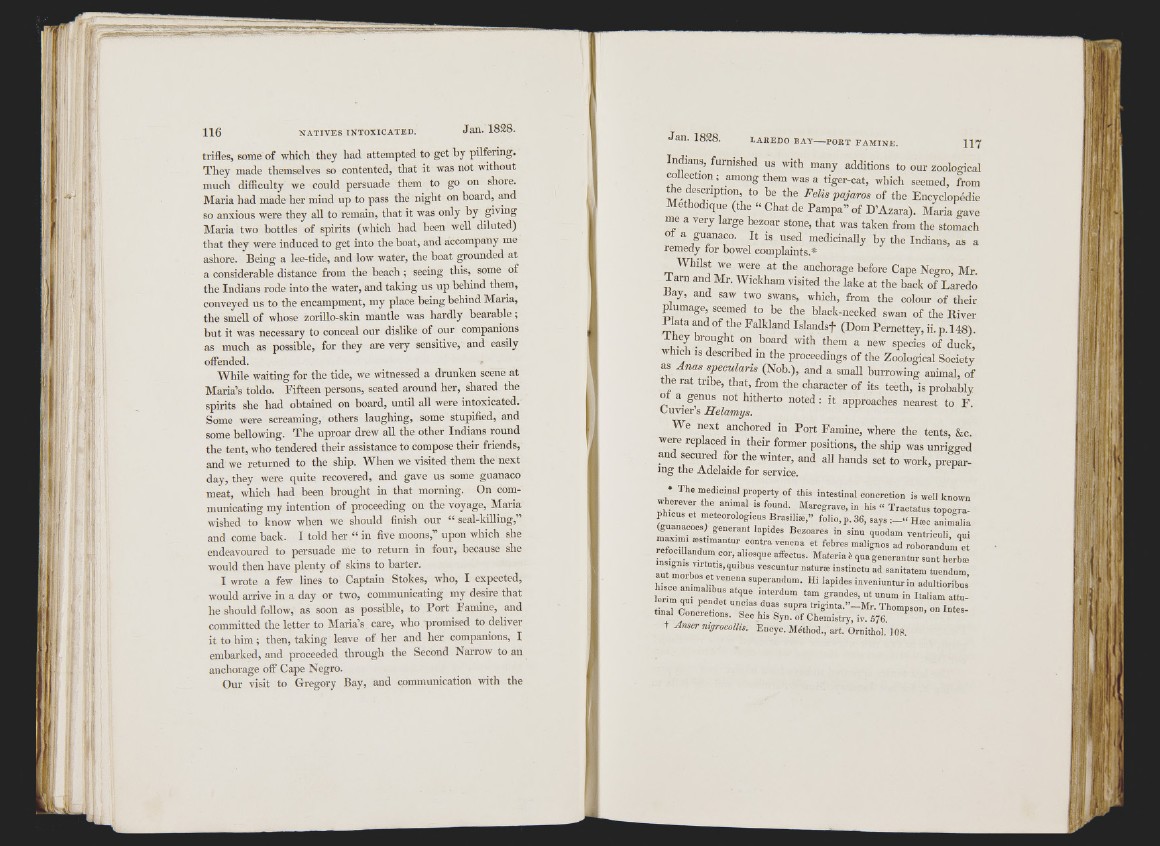
116 N A T IV E S INTO XICA T ED.
trifles, some of which they had attempted to get by pilfering.
They made themselves so contented, that it was not without
much difficulty we could persuade them to go on shore.
Maria had made her mind up to pass the night on board, and
so anxious were they aU to remain, that it was only by giving
Maria two bottles of spirits (which had been well diluted)
that they were induced to get into the boat, and accompany me
ashore. Being a lee^tide, and low water, the boat grounded at
a considerable distance from the beach ; seeing this, some of
the Indians rode into the water, and taking us up behind them,
conveyed us to the encampment, my place being behind Maria,
the smell of whose zorillo-skin mantle was hardly bearable;
but it was necessary to conceal our dislike of our companions
as much as possible, for they are very sensitive, and easily
offended.
While waiting for the tide, we witnessed a drunken scene at
Maria’s toldo. Fifteen persons, seated around her, shared the
spu-its she had obtained on board, until all were intoxicated.
Some were screaming, others laughing, some stupified, and
some bellowing. The uproar drew all the other Indians round
the tent, who tendered their assistance to compose their friends,
and we returned to the ship. When we visited them the next
day, they were quite recovered, and gave us some guanaco
meat, which had been brought in that morning. On communicating
my intention of proceeding on the voyage, Maria
wished to know when we should finish our “ seal-killing,
and come back. I told her “ in five moons,” upon which she
endeavoured to persuade me to return in four, because she
would then have plenty of skins to barter.
I wrote a few lines to Captain Stokes, who, I expected,
would arrive in a day or two, communicating my desire that
he should follow, as soon as possible, to Port Famine, and
committed the letter to Maria’s care, who promised to deliver
it to him; then, taking leave of her and her companions, I
embarked, and proceeded through the Second Narrow to an
anchorage off Cape Negro.
Our visit to Gregory Bay, and communication with the
Indians, furnished us with mauy additions to our zoological
collection; among them was a tiger-cat, which seemed, from
the description, to be the Felis pajaras of the Fncyclopedie
Méthodique (the “ Chat de Pampa” of D’Azara). Maria gave
me a very large bezoar stone, that was taken from the stomach
oi a guanaco. It is used medicinally by the Indians, as a
remedy for bowel complaints.*
Whilst we were at the anchorage before Cape Negro, Mr.
Tarn and Mr. Wickham visited the lake at the back of Laredo
Bay, and saw two swans, which, from the colour of their
plumage seemed to be the black-necked swan of the River
Plata and of the Falkland Islandsf (Dom Pernettey, ii. p. 148).
They bi-ought on board with them a new species of duck,
which IS descnbed in the proceedings of the Zoological Society
as Anas specularis (Nob.), and a small burrowing animal, of
the rat tribe, that, from the character of its teeth, is probably
o a genus not hitherto noted : it approaches nearest to F.
Cuvier s Helamys.
We next anchored in Port Famine, where the tents, &c.
were replaced in their former positions, the ship was unrigged
and secured for the winter, and all hands set to work, preparing
the Adelaide for service.
• The medicinal property of this intestinal concretion is well known
wherever the an .m a ( is found. Marcgrave, in his “ Trac ta tus topogra-
phicus et meteorologicus Brasilia;,” fo lio ,p .36, say s:—“ Hæc a n L a lia
(guanacoes) générant lapides Bezoares in sinu quodam ventriculi qui
L s te è i L r , M=*te>-iab qua g enerantur sunt herba;
aut mo bos e r ’^“ vescuntur n a tu re instinetn ad sanitatem tuendnm,
'^ P '- l - '- e n i u n t u r i n adultioribus
1 uncías duas supra triginta.”—Mr. Thompson, on Intestinal
Concretions. See his Syn. of Chemistry, iv. 576.
+ Anser nigrocolhs. Encyc. Method., art. Orn ith o l 108.